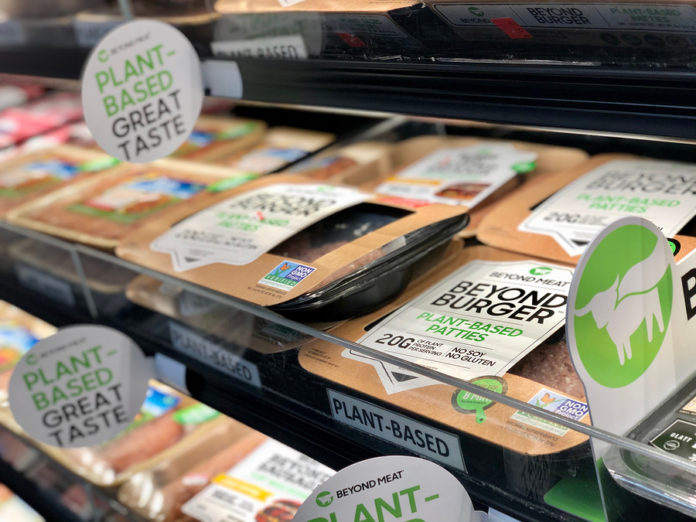
In looking at the predicted food trends for 2020, plant-based and sustainability stood out as the top two. COVID-19 may change the way these trends play out, according to a report from Culinary Tides. The food think tank predicts the current environment will at least temporarily reverse those two trends, along with the move toward nonalcoholic beverages and mocktails.
Plant-based meat
“COVID-19 will push meat eaters back to animal protein at an accelerated pace, while vegetarians will celebrate plants being plants,” according to Culinary Tides. With meat sales up by 91% for the week ending March 22, meat leads the sales increases in the supermarket perimeter, according to IRI.
Research shows curious meat eaters, not vegetarians, are responsible for much of the recent increase in plant-based meat sales, according to Culinary Tides. Supporting that position is Hartman Group’s Food & Technology 2019 report. The report found the top reason consumers purchased plant-based foods was the desire to try new flavors and cuisines. And, according to Evercore research analysts, the pandemic has changed consumer behavior from “novel and trendy” to “tried and true.”
“Let plants be plants is the motto going forward,” states Culinary Tides. The report also noted the decline in plant-based burger sales in food service that began before the pandemic. For example, in January, Burger King dropped the price of the Impossible Whopper due to declining sales. Plus, a January Investor’s Business Daily article reported that Beyond Meat stock was down because slowing sales for Impossible Foods created fears of weaker demand for plant-based meat.
Sustainability
Culinary Tides expects sales based on sustainability claims to decrease due to cost, not to a lack of desire among consumers for sustainable products. Sustainable actions that will continue during COVID-19 are reduced consumerism, composting, and buying ugly produce because they have no cost barrier. However, Culinary Tides believes sustainability spending will return as the economy recovers and consumer confidence rebounds.
Another aspect of sustainability in the COVID-19 environment is the move away from reusable bags and containers, although some sources question whether single-use plastics are really safer. Break Free From Plastic notes properly washed reusables are safe, and viruses can linger on single-use disposables for at least several days.
Nonalcoholic beverages
“When times are difficult, consumers drink,” states Culinary Tides. The return to alcohol will be most noticeable among Baby Boomers, Gen X, and older Millennials. Younger Millennials and Gen Z are more likely to remain sober curious.
When consumers feel confident, cocktails are the leading beverage. When consumers lack confidence, they turn to beer and wine, according to Culinary Tides. The report predicts wine and beer sales will increase; hard seltzer, single spirits, and simple cocktails sales will remain steady; and complex cocktail sales will decrease.
Other changes in food-buying behavior
The novel coronavirus has also changed other consumer buying patterns. Previously, shoppers were buying more exotic and organic produce but have now returned to staples, like potatoes, apples, and oranges. Consumers are now also more drawn to buying items in cellophane bags. The previous trend toward buying smaller packages of value-added products has been replaced by a demand for bigger packages that allow fewer trips to the store.
Despite what’s happening at the moment, predicting the long-term effects of COVID-19 is difficult. Will consumers eventually return to previous behavior or will the pandemic create a permanent change in consumer shopping patterns?








